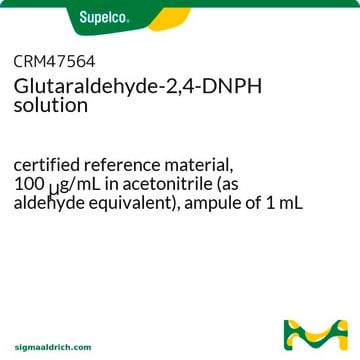W512303
Glutaric dialdehyde solution
50 wt. % in H2O, FCC
Synonym(s):
Glutaraldehyde solution, Glutaric dialdehyde solution, Pentane-1,5-dial
About This Item
Recommended Products
biological source
synthetic
Quality Level
grade
Kosher
reg. compliance
FCC
form
liquid
concentration
50 wt. % in H2O
50.0-52.5% (FCC monograph)
impurities
may contain ≤0.5% Methanol (residual solvent)
refractive index
n20/D 1.42
application(s)
flavors and fragrances
Documentation
see Safety & Documentation for available documents
food allergen
no known allergens
Organoleptic
medicinal; pungent
SMILES string
[H]C(CCCC([H])=O)=O
InChI
1S/C5H8O2/c6-4-2-1-3-5-7/h4-5H,1-3H2
InChI key
SXRSQZLOMIGNAQ-UHFFFAOYSA-N
Looking for similar products? Visit Product Comparison Guide
Application
- Synthesis and Characterization of N-Isopropylacrylamide Microspheres as pH Sensors.: This article details the development of microspheres from glutaric dialdehyde solution for use as pH sensors, showcasing their potential in biochemistry applications for sensitive and accurate pH monitoring (Lavine et al., 2021).
- Characterization and application of chondroitin sulfate/polyvinyl alcohol nanofibres prepared by electrospinning.: This study investigates the properties of chondroitin sulfate/polyvinyl alcohol nanofibers crosslinked with glutaric dialdehyde. The fibers exhibit enhanced biocompatibility and structural integrity, suggesting their utility in advanced drug delivery systems and tissue engineering (Guo et al., 2016).
- Thermosensitive Behavior and Antibacterial Activity of Cotton Fabric Modified with a Chitosan-poly(N-isopropylacrylamide) Interpenetrating Polymer Network Hydrogel.: This publication presents the modification of cotton fabric with a hydrogel formed using glutaric dialdehyde. The fabric demonstrates significant thermosensitive and antibacterial properties, suitable for developing smart textiles and wound dressings (Wang et al., 2016).
Disclaimer
Signal Word
Danger
Hazard Statements
Precautionary Statements
Hazard Classifications
Acute Tox. 3 Inhalation - Acute Tox. 4 Oral - Aquatic Acute 1 - Aquatic Chronic 2 - Eye Dam. 1 - Resp. Sens. 1 - Skin Corr. 1B - Skin Sens. 1 - STOT SE 3
Target Organs
Respiratory system
Supplementary Hazards
Storage Class Code
6.1A - Combustible acute toxic Cat. 1 and 2 / very toxic hazardous materials
WGK
WGK 3
Flash Point(F)
Not applicable
Flash Point(C)
Not applicable
Personal Protective Equipment
Choose from one of the most recent versions:
Already Own This Product?
Find documentation for the products that you have recently purchased in the Document Library.
Customers Also Viewed
Our team of scientists has experience in all areas of research including Life Science, Material Science, Chemical Synthesis, Chromatography, Analytical and many others.
Contact Technical Service






